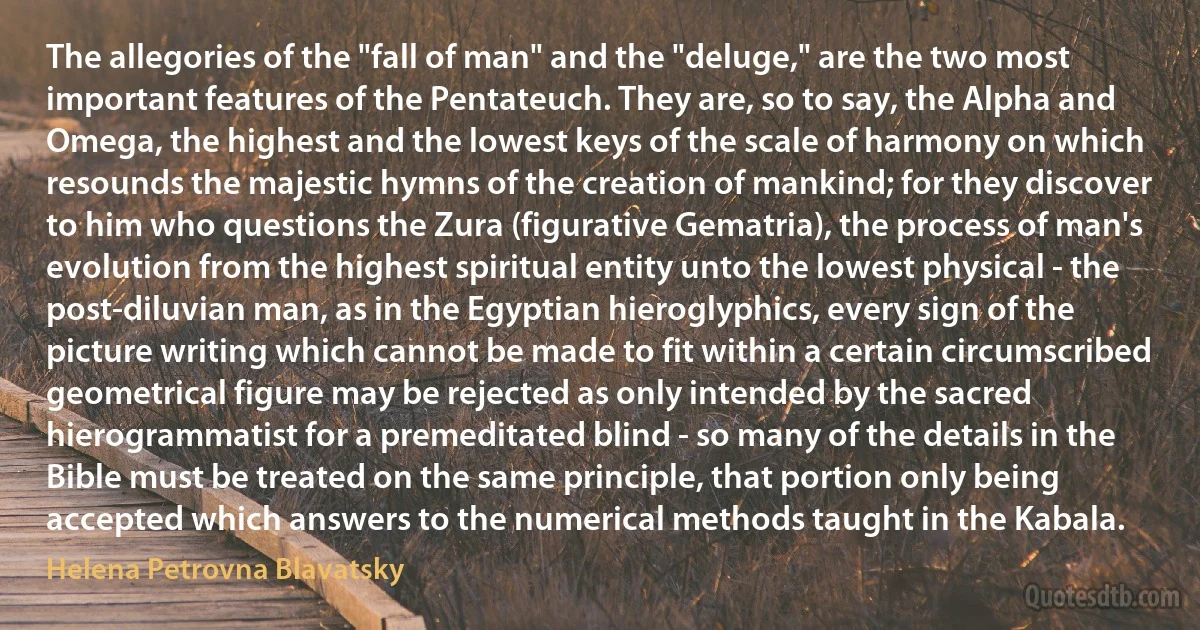
The allegories of the "fall of man" and the "deluge," are the two most important features of the Pentateuch. They are, so to say, the Alpha and Omega, the highest and the lowest keys of the scale of harmony on which resounds the majestic hymns of the creation of mankind; for they discover to him who questions the Zura (figurative Gematria), the process of man's evolution from the highest spiritual entity unto the lowest physical - the post-diluvian man, as in the Egyptian hieroglyphics, every sign of the picture writing which cannot be made to fit within a certain circumscribed geometrical figure may be rejected as only intended by the sacred hierogrammatist for a premeditated blind - so many of the details in the Bible must be treated on the same principle, that portion only being accepted which answers to the numerical methods taught in the Kabala.
Helena Petrovna BlavatskyRelated topics
alpha blind certain egyptian entity evolution fall fit harmony man numerical omega pentateuch picture say sign teach questionsRelated quotes
Alike in the highest regions of speculation and in the smaller practical concerns of daily life, her mind was the same perfect instrument, piercing to the very heart and marrow of the matter; always seizing the essential idea or principle. The same exactness and rapidity of operation, pervading as it did her sensitive as well as her mental faculties, would, with her gifts of feeling and imagination, have fitted her to be a consummate artist, as her fiery and tender soul and her vigorous eloquence would certainly have made her a great orator, and her profound knowledge of human nature and discernment and sagacity in practical life, would, in the times when such a carrière was open to women, have made her eminent among the rulers of mankind. Her intellectual gifts did but minister to a moral character at once the noblest and the best balanced which I have ever met with in life.

John Stuart Mill
The absolute rights of man, considered as a free agent, endowed with discernment to know good from evil, and with power of choosing those measures which appear to him to be most desirable, are usually summed up in one general appellation, and denominated the natural liberty of mankind. This natural liberty consists properly in a power of acting as one thinks fit, without any restraint or control, unless by the law of nature: being a right inherent in us by birth, and one of the gifts of God to man at his creation, when he endowed him with the faculty of freewill. But every man, when he enters into society, gives up a part of his natural liberty, as the price of so valuable a purchase; and, in consideration of receiving the advantages of mutual commerce, obliges himself to conform to those laws, which the community has thought proper to establish.

William Blackstone
As a graduate student at Yale, I studied the whole of Christian theology but focused my attention on the Darwinian controversies. I wanted to get to the root of the conflict between Darwinian evolution and Christian doctrine. In the course of my research I learned (to my surprise) that biblical chronology played almost no role in the 19th- century controversies, since most theologians had already accepted geological evidence for the age of the earth and re-interpreted the days in Genesis as long periods of time. Instead, the central issue was design. God created the cosmos with a plan in mind. This affirmation is among the most basic in all of Christianity (and other theistic religions as well, including Unificationism). And that plan included human beings as the final outcome of the creative process: we are created in the image of God.

Jonathan Wells
The study of inbreeding depression seems to me especially important in the study of human abilities, because inbreeding depression indicates genetic dominance, and the presence and degree of dominance are related to natural selection for the trait in the course of its biological evolution. It was of great interest to me to discover, for example, that of the several ability factors that can be extracted from the various subtests of the Wechsler Intelligence Scale for Children, the one that shows the greatest susceptibility to inbreeding depression is the g factor (Jensen, 1983b). This finding indicates that one of our most widely used standard psychometric tests of intelligence yields scores that reflect some part of the variance in the biological intelligence that has developed in the course of human evolution.

Arthur Jensen
Just as no thing or organism exists on its own, it does not act on its own. Furthermore, every organism is a process: thus the organism is not other than its actions. To put it clumsily: it is what it does. More precisely, the organism, including its behavior, is a process which is to be understood only in relation to the larger and longer process of its environment. For what we mean by "understanding" or "comprehension" is seeing how parts fit into a whole, and then realizing that they don't compose the whole, as one assembles a jigsaw puzzle, but that the whole is a pattern, a complex wiggliness, which has no separate parts. Parts are fictions of language, of the calculus of looking at the world through a net which seems to chop it up into bits. Parts exist only for purposes of figuring and describing, and as we figure the world out we become confused if we do not remember this all the time.

Alan Watts
